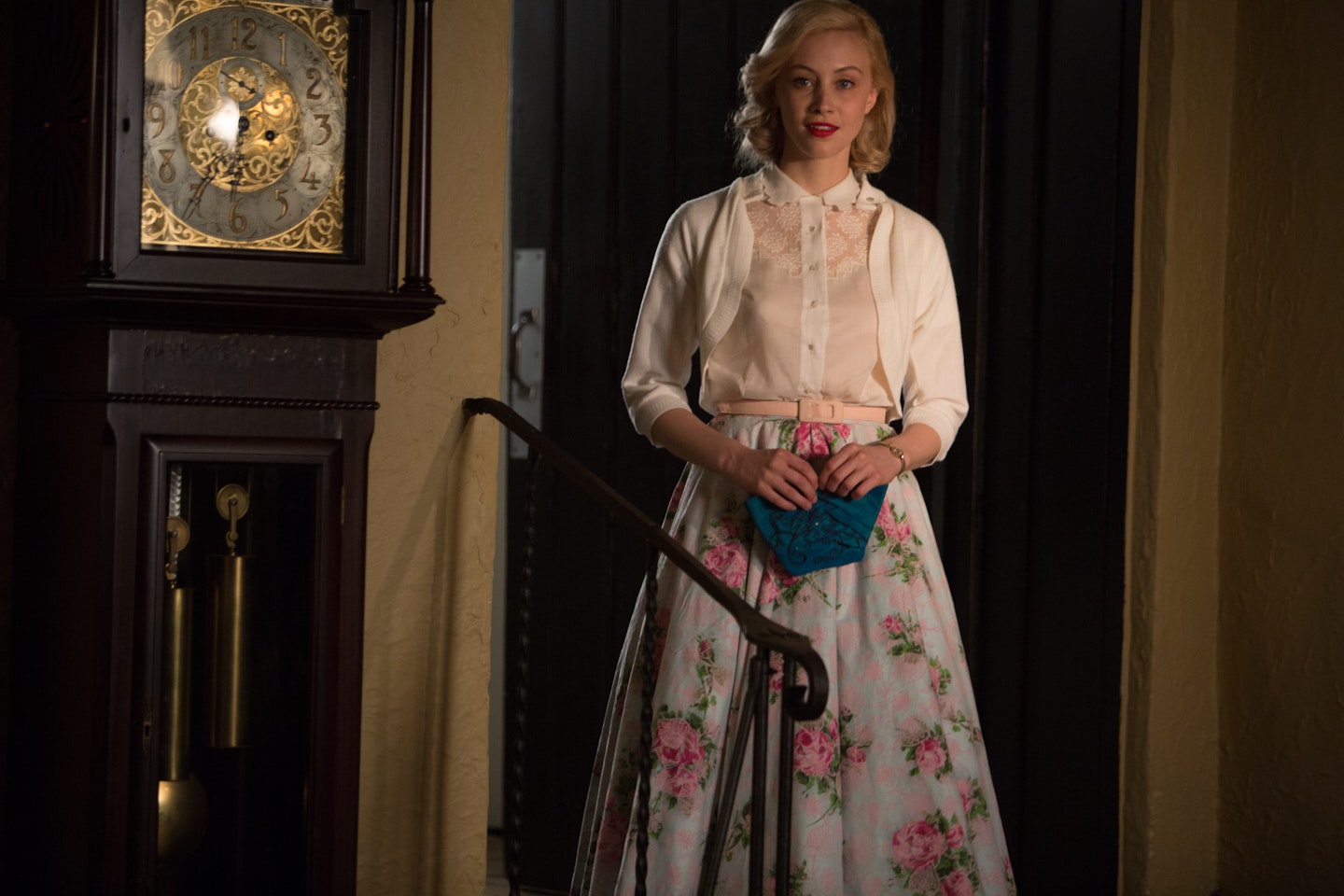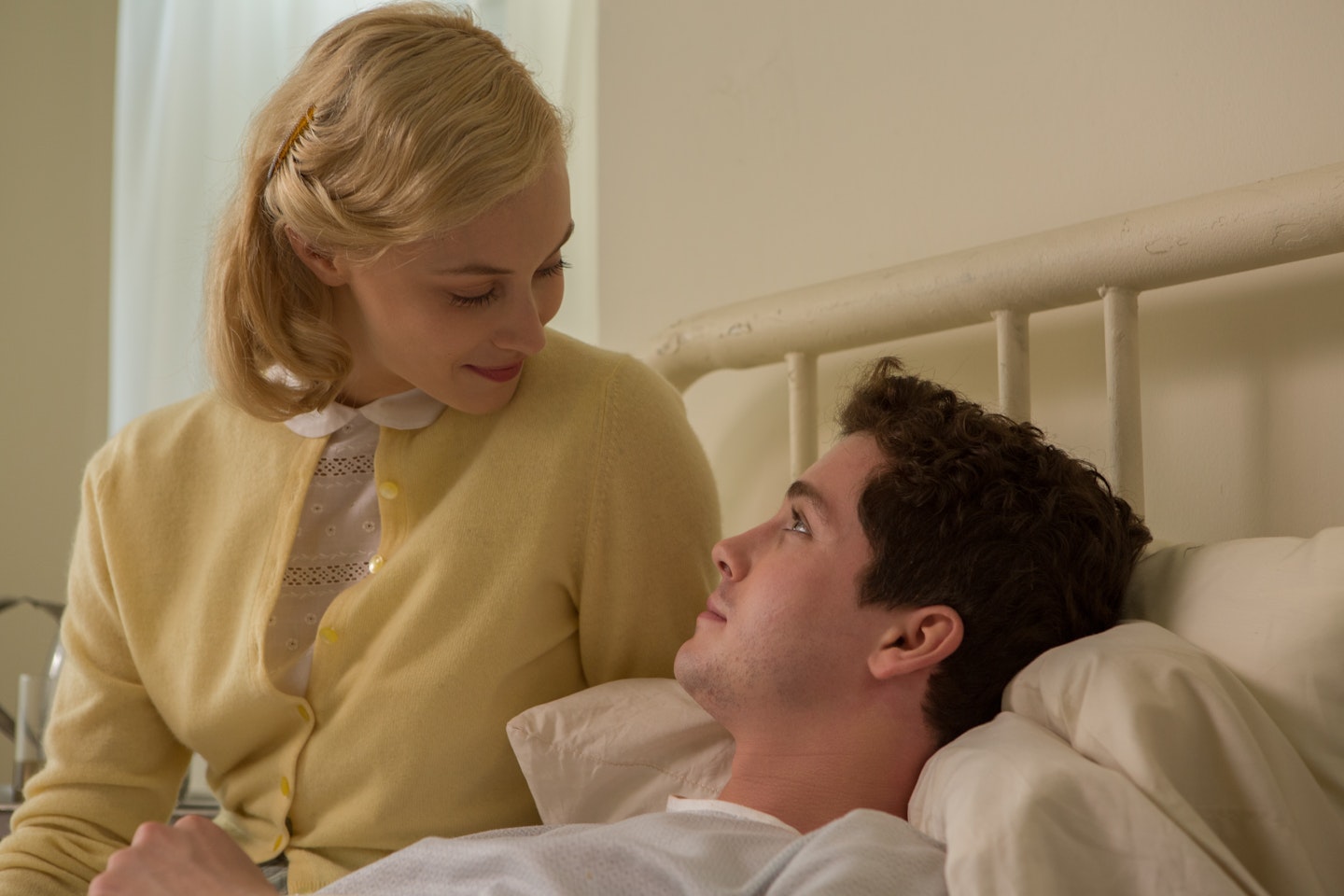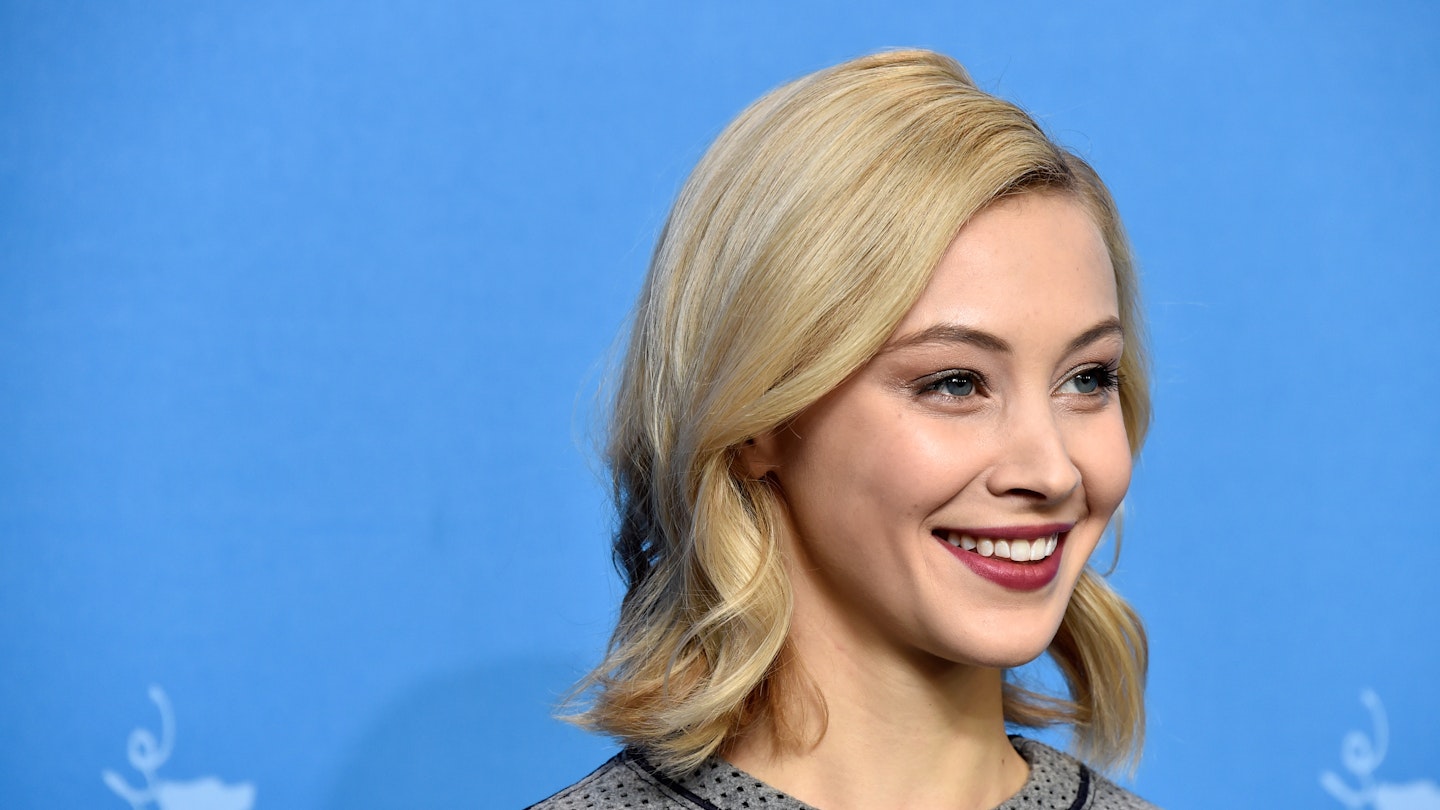Sarah Gadon is an actress who is difficult to pigeonhole. At 29, her resumé is impressive in both its eclecticism and its star power. In the past few years alone, she’s worked with JJ Abrams on his time-travelling period piece 11.22.63, held her own opposite the likes of Julianne Moore and snagged the lead in Netflix’s Alias Grace, a miniseries based on Margaret Atwood’s acclaimed novel.
No stranger to book-to-film projects, her latest is Indignation, an adaptation of Philip Roth’s novel. Set in 1951, the coming-of-age story sees Marcus (Logan Lerman) move away to college to avoid being drafted to Korea – only to find that his school is even more oppressive and straight-laced than his family home. Immediately drawn to his classmate Olivia (played by Gadon), he’s forced to confront his own conservatism, too: while she may look like the paradigm of ‘50s femininity, she soon proves to be a far more complex – and, for the inexperienced and sheltered Marcus, puzzling – prospect.
Ahead of the film's release, we caught up with Sarah to talk about Olivia's enigmatic character, sexual double standards and why milking a cow could be the new meditation...
In Indignation, Olivia seems so poised from the outside, but she's dealing with so much underneath that. How did you go about getting into character?
When James [Schamus, the director] and I sat down to talk about the film and the novel, he mentioned to me that he thought that Sylvia Plath was a huge influence on Philip Roth's writing of this character, and so that was a really good way in for me. I revisited a lot of Plath’s writing; the angst and the intensity of her work really helped me to understand Olivia.
What did you find most intriguing about her?
What I really liked about her, personally, was that from the outside, she is a visual indicator of this very romantic idea of a college girl in the 1950s - she almost looks like a Hollywood movie star - but underneath that is somebody who is fighting against this exterior image. She's fighting against the expectations that come with this aesthetic, and I found that contrast with what was going on inside really fascinating. I think sometimes as women, we face these expectations that society has, or that our communities have for us, and underneath we might feel as though we can't meet - or don't need to meet - them.
The presentation of her mental health is really interesting - she's so open about something that was very taboo. What was it like to approach that aspect?
I thought it was really brave of her to be so outspoken. I do also think that one of the most fascinating and compelling things that happens in the novel is when Olivia just disappears, and this happens also in the film. It's a very blatant reminder that often women were just put away or conveniently 'disappeared' if they couldn't conform, and I think that's a very powerful message - in the film it proves to be Marcus' unravelling.
Much of the film hinges around an example of what we'd now call slut-shaming. Do you think the way that women are judged on their sexuality has moved on?

I would hope so. One of my favourite scenes in the film is when Olivia goes up to Marcus and confronts him about his slut-shaming behaviour. She's just like, 'I wanted to do this and I did it, so I don't see the problem with that,' and he's so shocked with how blunt she is. I do think, though, that our first sexual encounters are often shrouded in confusion and shame and uncertainty, and that was a place I could easily access, even though I was of course approaching the story from a contemporary point of view.
Did the film script feel more sympathetic to Olivia than the original novel?
In ways, yes. I think James is a very smart filmmaker to use the opening sequence [which sees an older Olivia reading a letter] as a way of questioning perspective, and I really liked that when I read the script. I thought that was the best departure from the novel that he took on.
Although it's set in the 1950s, there are definitely aspects of the film that feel very timely. Was it interesting to explore those parallels?
I think that James was very cogniscient of the fact that this is a film about bright young minds in America and what happens to them when they bump up against the dominant power structures. It's always relevant to ask what happens to young people when they question our system, when they question power and how people gain that power.
What was it like to work with James on his first film as a director?
It was such a special experience. He is so intelligent, he’s so beloved by the indie filmmaking community and is a very thoughtful and sensitive collaborator. I knew it was going to be special which is why I wanted to do the film so badly.
What do you look for when you're choosing projects?

I studied film theory and criticism and became obsessed with auteur film-making so it became really important for me to chase directors, which was what I did for so long... It's funny because when I finished working with James, he said "You should really start chasing roles instead!" That was his parting advice, and I'm taking it to heart. The film nerd in me would still love to work with Steven Soderbergh, Tarantino or Jane Campion - the list could go on and on...
You've just wrapped on the Netflix adaptation of Margaret Atwood's novel, Alias Grace. What was it like to play Grace?
It was one of the most challenging and fulfilling experiences I've ever had as an actor. The novel spans Grace's entire lifetime, and she has this very brutal, very cruel life, so it was really emotionally intense. Every day it was either being imprisoned, being tortured, being oppressed in some way - they really put me through my paces! [Screenwriter] Sarah Polley and [director] Mary Harron are really dedicated - they wanted to put me through the ringer and they did.
How did you prepare?
I had to do all kinds of things... Grace originally came from Belfast, so I had to master the Northern Irish accent. When I was shooting Dracula Untold, I lived in Belfast for five months, which was a really great coincidence because I could call all my friends from there and say 'Can you record 600 pages of dialogue for me? Because that would be great!' I was listening to BBC Radio Ulster and even gardening podcasts - it's not the easiest to get your head around, and if I hadn't been immersed in it for that period of time, I'm not sure what I would have done. Then there's the whole central motif of the story, which is quilting, so I had to learn how to sew and quilt, and learn everything about being a housemaid in the 1840s. One thing I really enjoyed was learning how to milk a cow. It's actually very peaceful - very therapeutic.
Did Margaret Atwood have much involvement in the project?
Yes, she was pretty involved. Sarah is very close to her, and when she got the rights to the novel, Margaret read every single draft of the script; she watched everyone's audition tape; she was in and out of our production offices and she even had a cameo role.
You've worked on shows for Netflix and for Hulu now. Do you think streaming platforms are creating more interesting roles for actresses?

These platforms are investing in making so much new content which is great, but they're also handing back the power to the creators - it's completely changing the way that television and films are getting made. They've loosen the iron grip that networks used to have, and it's quite liberating, I think. They're not beholden to numbers or advertisers; they're beholden to the people who stream their shows. It's encouraging a much more powerful sense of creative vision in the film-making community, and it's been really great for me: I had a wonderful time on 11.22.63 and I had an incredible time on Alias Grace, and those are projects that I never would've been able to do otherwise.
Are you one of those people with a huge 'to watch' list on Netflix?
I have so much to watch; I've been working so hard that I haven't watched anything much recently, but the first things I want to see are Black Mirror and Stranger Things. I've just started The Crown, though - it's so beautiful to watch, I can't wait to finish it. I'm starting a film in January, but I'm taking a break until then so there'll be time...
Indignation will be released by Vertigo Releasing in the UK and Ireland on 18th November.
READ MORE: Max Irons: Seven Things You Need To Know About The Brit Actor
